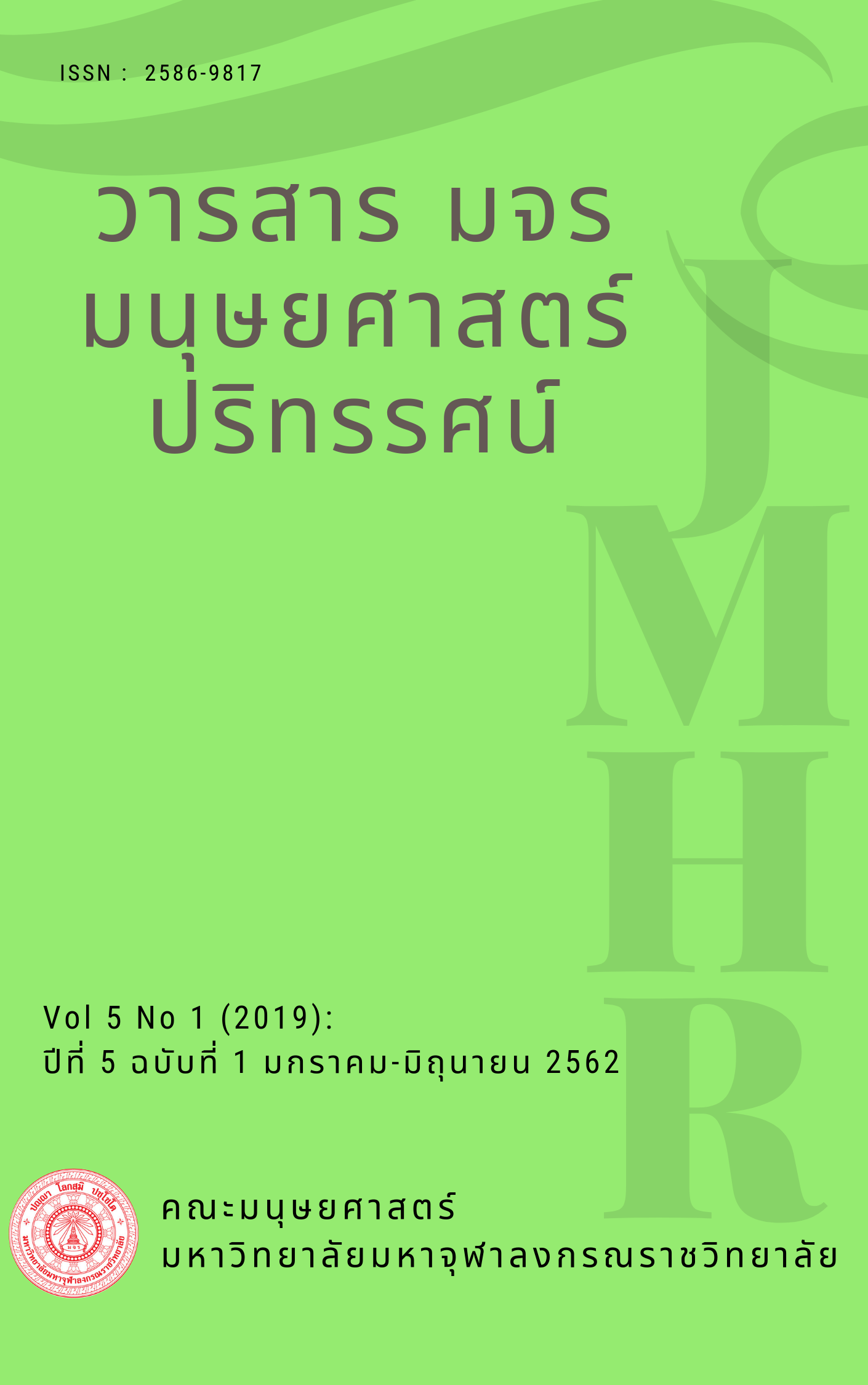การส่งเสริมประชาธิปไตยเชิงพุทธบูรณาการ
คำสำคัญ:
การส่งเสริม, ประชาธิปไตยเชิงพุทธบูรณาการบทคัดย่อ
การศึกษาวิจัย เรื่อง การส่งเสริมประชาธิปไตยเชิงพุทธบูรณาการ มีวัตถุประสงค์ 1. เพื่อศึกษาเปรียบเทียบการส่งเสริมประชาธิปไตยทั่วไป 2. เพื่อศึกษาเปรียบเทียบการส่งเสริมประชาธิปไตยเชิงพุทธ 3. เพื่อหาแนวทางการส่งเสริมประชาธิปไตยเชิงพุทธ
รูปแบบการวิจัยเป็นการวิจัยแบบผสานวิธี (Mixed Method) ประกอบด้วย การวิจัยเชิงปริมาณ (Quantitative Research) กลุ่มตัวอย่าง ได้แก่ ประชาชนในเขตกรุงเทพมหานคร จากการกำหนดขนาดกลุ่มตัวอย่างของ เครซี่ (Krejcie) และมอร์แกน (Moregan) ได้จำนวน 400 คน และการวิจัยเชิงคุณภาพ (Qualitative Research) จากการศึกษาค้นคว้าจากเอกสาร และการสัมภาษณ์เชิงลึก (In-Depth Interview) ผู้ให้ข้อมูลที่สำคัญ (Key Informants) จากเจ้าหน้าที่ที่มีส่วนเกี่ยวข้องในการส่งเสริมประชาธิปไตย ได้แก่ สำนักงานคณะกรรมการการเลือกตั้ง และสถาบันพระปกเกล้า
ผลการศึกษาวิจัยพบว่า
- ผู้ตอบแบบสอบถามส่วนใหญ่เป็นเพศชายมากกว่าเพศหญิง มีอายุไม่เกิน 30 ปี มีการศึกษาระดับปริญญาตรี มีสถานภาพสมรส ประกอบอาชีพธุรกิจส่วนตัว และมีรายได้ต่อเดือนระหว่าง 15,001 – 20,000 บาท และ 20,001 – 25,000 บาท ผู้ตอบแบบสอบถามมีระดับความคิดเห็นต่อการส่งเสริมประชาธิปไตยทั่วไป โดยรวมอยู่ในระดับมาก โดยผู้ตอบแบบสอบถามมีความคิดเห็นต่อการส่งเสริมประชาธิปไตย ทั่วไป ด้านค่านิยมพื้นฐาน อยู่ในอันดับแรก อันดับรองลงมา ได้แก่ ด้านการกล่อมเกลาการเมือง และด้านอุดมการณ์แบบประชาธิปไตย ด้านการพัฒนาทางการเมือง และด้านการรับรู้ข่าวสาร
- ผู้ตอบแบบสอบถามมีระดับความคิดเห็นต่อการส่งเสริมประชาธิปไตยเชิงพุทธ โดยรวมอยู่ในระดับมาก โดยผู้ตอบแบบสอบถามมีความคิดเห็นต่อการส่งเสริมประชาธิปไตยเชิงพุทธ ด้านความมีจิตสำนึก อยู่ในอันดับแรก อันดับรองลงมา ได้แก่ ด้านความสุจริต ด้านความซื่อสัตย์ ด้านความรอบคอบ ด้านความอดทน ด้านความยุติธรรม ด้านความเสียสละ ด้านความสามัคคี และด้านรักษาสัญญา
- แนวทางการส่งเสริมประชาธิปไตยเชิงพุทธ เชื่อในการเปลี่ยนแปลงโดยสันติว่าการเปลี่ยนแปลงทางการเมืองจะต้องมีอยู่เสมอ ควรส่งเสริมความรู้ทางด้านประชาธิปไตยในครอบครัว และการมีส่วนร่วมของประชาชน กระจายอำนาจให้ท้องถิ่นเพื่อแก้ไขปัญหาความเหลื่อมล้ำทางเศรษฐกิจอย่างเร่งด่วน
- ข้อเสนอแนะ ผู้ที่มีส่วนเกี่ยวข้องกับการส่งเสริมประชาธิปไตยต้องมีวิสัยทัศน์กว้างไกล มีความซื่อสัตย์ บริหารงานโปร่งใส ยึดผลประโยชน์ของประชาชน และยึดหลักธรรมาภิบาลเป็นหลัก มีจรรยาบรรณ ภาครัฐควรส่งเสริมประชาธิปไตยเชิงพุทธในสังคมไทย โดยการปลูกฝังและสร้างจิตสำนึกให้ประชาชนได้มีส่วนร่วม มีวิธีคิดและวิถีการดำเนินชีวิตที่เป็นประชาธิปไตย
เอกสารอ้างอิง
Charles Blattberg. (2000). From Pluralist to Patriotic Politics: Putting Practice First. Oxford: Oxford University Press.
Kamon Chadawattana. (2006). People Management and Work according to the principles of the Buddha. Bangkok: Chaba Plubiching Work.
Mueller Kosecoff. (1998). Organization Behavior.London.,SAGE Publication,Inc.,
Panupol phuha. (2011). Dosit Dhamma and Administration of Subdistrict Administration Organization: Case Study Bang Phriang Subdistrict Administrative Organization, Bang Bo District, Samut Prakan Province. Master of Buddhist Thesis Graduate School: Mahachulalongkornrajavidyalaya University.
Phra Phrom Kunaporn. (1997). Life Statute. Bangkok: National Buddhism Office.
Prasarn Thongpakdee. (2002) Principles of governance. Bangkok: Dhurakij Pundit University.
Kovitwong Surawat. (2001). State of Political Science and Politics. Bangkok: Lamp Publishing.
Office of the Constitutional Court. (2014).Constitutional Court and democratic development in the state law system. Including academic articles of the Constitutional Court Office. Bangkok: Office of the Constitutional Court.






